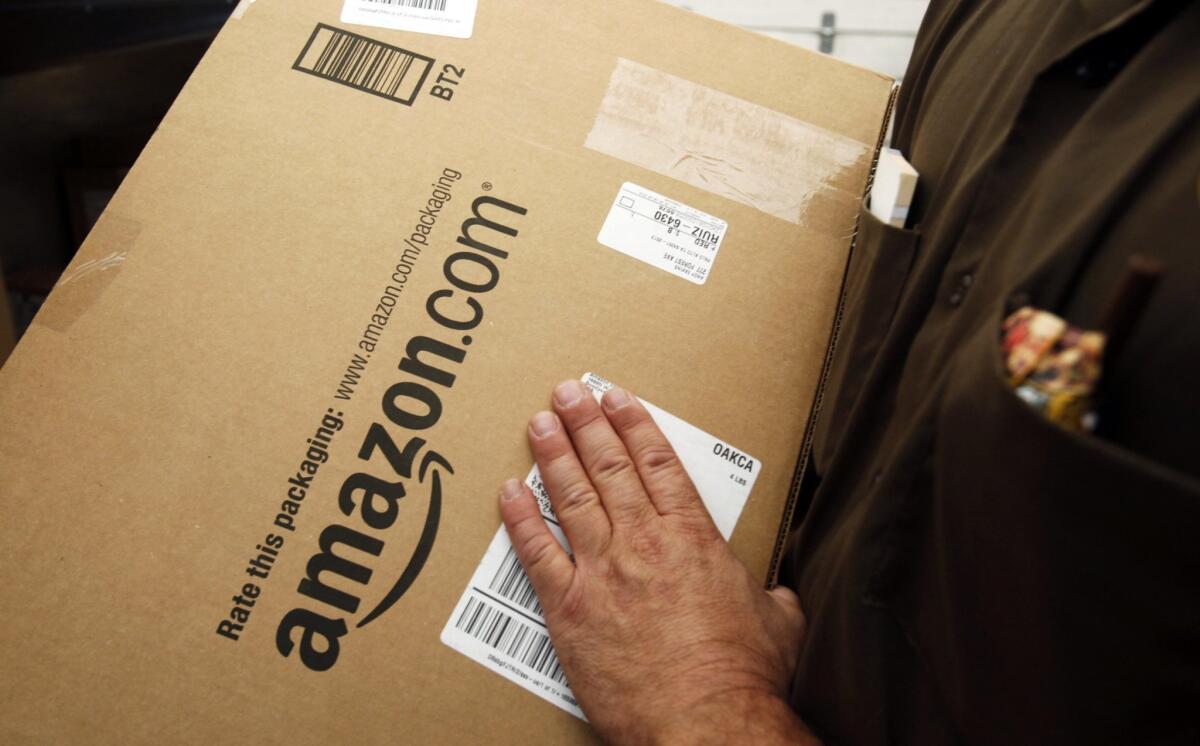Opinion: Supreme Court tells Amazon workers no pay for shift-end screenings

- Share via
A decision by the Supreme Court on Tuesday spotlights the occasionally wide gap between common-sense fair play and the law. The law always wins, of course. But that doesn’t mean it’s right.
The case was brought by workers for Integrity Solutions, which provided labor for an Amazon warehouse in Nevada. As part of the workers’ end-of-shift routine, they were required to go through a security screening to make sure they weren’t carting off any of Amazon’s goods. The screening, according to the workers’ complaints, often took up to 25 minutes, adding hours to the work week. Time, since they had clocked out already, for which the workers were not paid.
The Times editorialized in October that the Supreme Court should recognize that this was an imposed work condition for which the employees should be paid:
“The issue goes back to the 1938 Fair Labor Standards Act and the Portal-to-Portal Act of 1947, which together established rules about what is considered work time. Subsequent court decisions have held that walking from one’s car to one’s work site, for instance, is not considered part of the compensable workday.
“But if an activity is ‘an integral and indispensable part of the principal activities for which covered workmen are employed,’ then the time it takes to do the activity should be paid for, the Supreme Court ruled in Steiner vs. Mitchell in 1956. Donning protective clothing at the start of a shift is not covered, though the court has said (following a seemingly inconsistent logic) that the time it takes to remove the clothing and decontaminate at the end of the shift should be covered.
“The question in the Integrity case is whether waiting in line for an antitheft body search, at the insistence of the employer and for the employer’s benefit, fits under that ‘integral and indispensable’ definition. We think it does. Secretaries and other Amazon workers were not subjected to the search, just those who worked in the warehouse. By making it part of a warehouse worker’s daily job requirement, the company deemed it indispensable.
“Of course, Integrity could have made this a moot point if it had hired enough screeners to handle the end-of-shift traffic in a reasonable amount of time. Screening itself takes just a minute or two, but the delays were caused by the employer’s refusal to properly staff the screening kiosks, saving itself money while taking up to 25 minutes a day of its workers’ time.”
The court didn’t see it that way. In the unanimous ruling, Justice Clarence Thomas stuck to a narrow “integral and indispensable” definition, and said that while waiting to be screened took up the workers’ time, it was not the purpose for which they were hired so they weren’t entitled to pay. Thomas wrote that the U.S. 9th Circuit Court of Appeals, which overturned a lower-court ruling against the workers’ claim, erred in equating employer requirements with actions that were “integral and dispensable” to the main job of filling orders.
If that is indeed the letter of the law, then Congress should change it. It’s unconscionable that an employer can detain a worker on the work site for purposes of making sure the employee isn’t stealing anything, without paying for the time. If standing in that line for nearly 2½ hours a week is a requirement of the job, then it should be paid as part of the job.
Follow Scott Martelle on Twitter @smartelle.
More to Read
A cure for the common opinion
Get thought-provoking perspectives with our weekly newsletter.
You may occasionally receive promotional content from the Los Angeles Times.










